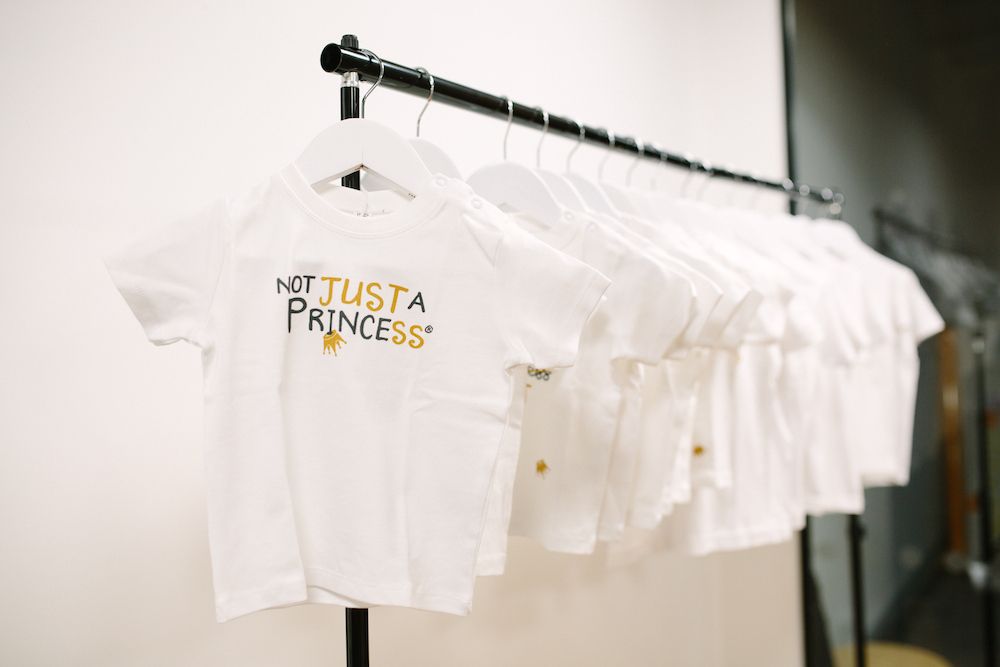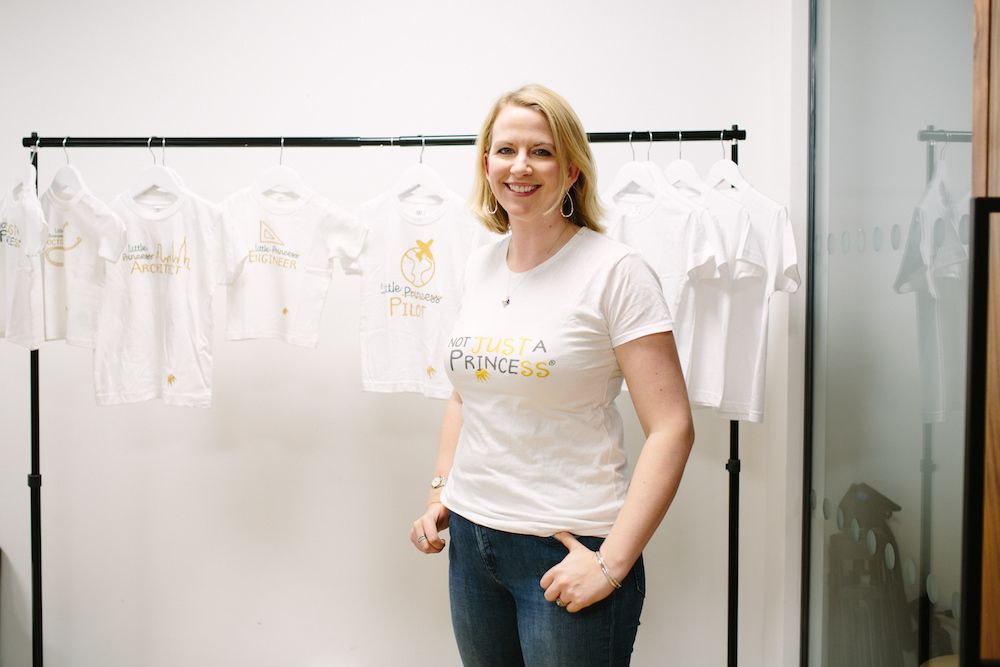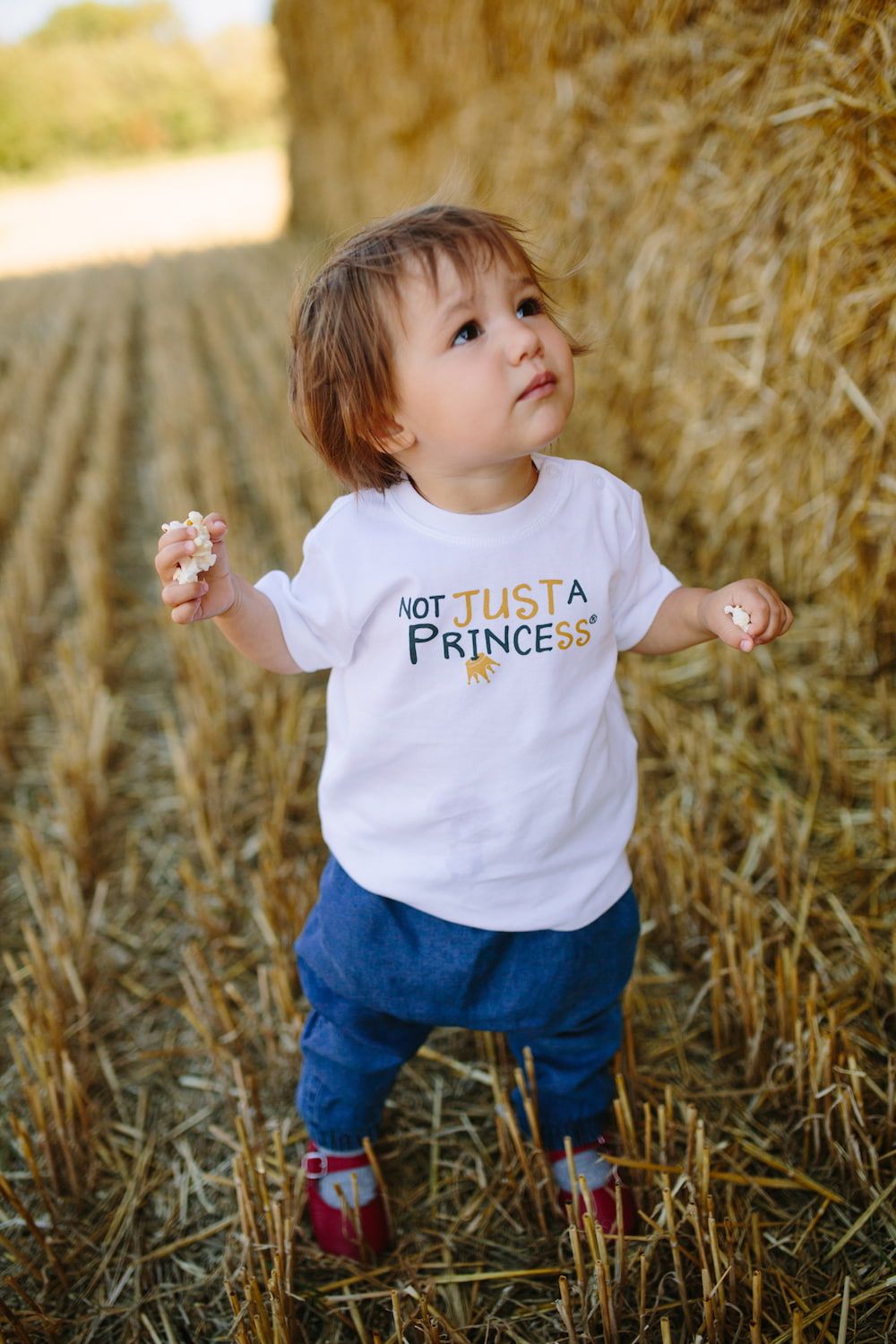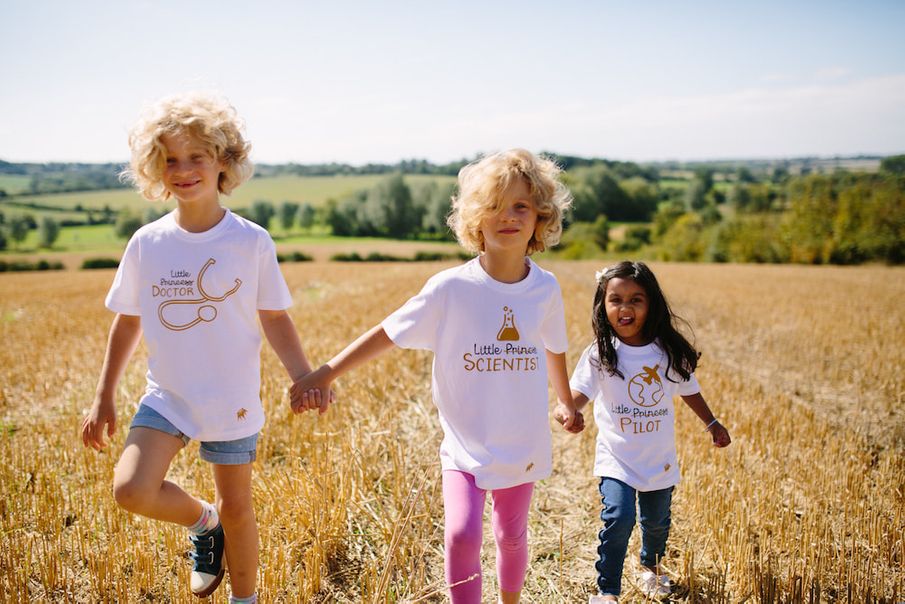Throughout life, we’re bombarded with messages about who we should be. From the films we watch growing up, to the clothes we’re dressed in, and the toys we play with. When business psychologist Jennifer Toll stopped to think about the messages that were seeping into her young daughter's life, she knew she had to do something – and so Not Just A Princess was born.
More than a brand selling modern, aspirational slogan T-shirts, Not Just A Princess runs deeper to fuel a movement of parents who want to show their daughters that the sky truly is the limit. And it’s right on time
"It all started when my daughter was given a plastic plate with a fairy princess on. I looked at it and thought: what else is out there? What about all the occupations she could go into? And then I started seeing that actually, really, you’ve got a choice of a mermaid, princess, and the occasional unicorn.”
Jennifer Toll is addressing a room full of career-driven, game-changing women, here to celebrate the launch of Not Just A Princess, Jen’s start-up brand set to challenge the restrictive career stereotypes that hold women and girls back from reaching their full potential.
In one corner of the room, there’s a rack of child-sized T-shirts with slogans that read things like “little scientist” and “little architect”, to name but a few. On the walls are quotes from women who are thriving in male-dominated careers: a data analyst, a pilot, a vicar.
These two things are the cornerstones of Not Just A Princess’s mission to empower girls, and banish the messages that cap their potential.

Photography | Jessica Jill Photography
The plan is two-fold: first, sell inspirational T-shirts where 12.5% from each sale is donated to Inspiring Girls International – the charity that provides face-to-face or virtual sessions with women talking about their jobs to school-aged girls. Second is to create an online archive of inspirational stories from women who are thriving in their careers.
Coming together, Jen hopes Not Just A Princess is the movement that will banish gender-specific messages that are internalised in a second, but leave us with a lifetime of restricting self-image.
The opening speech is met with applause and, as the room begins to mingle, I grab a quiet moment with Jen to chat more about her mission.
The princess and the tee
In her “other life” Jen is a business psychologist, and she notes that it was this background that first drew her attention to the level of gendered messaging in children’s clothing, toys, and – in Jen’s daughter’s case – dinnerware.
In all these, she recognised “limiting beliefs” (ideas we hold on ourselves that constrain our potential) and messaging (the subtle, often social, messages that we unconsciously internalise) in the branding of items aimed at our children.
But it was Jen’s lived experience that showed her how limiting these messages can be. In her welcome speech, she introduced herself as a “recovering perfectionist”, and she refers to it again in our interview when she explains that this perfectionism came hand-in-hand with a fear of getting things wrong, and of taking risks.
“Women are a lot more prone to perfectionism, and they struggle more with risk-taking when it comes to something like career resilience, or asking for pay rises,” Jen says.
“It’s difficult to know exactly where that may have come from, but then all you have to do is look at the clothing, look at the messaging and stories, and you can see that’s got to be part of it.”
In February, Asda came under fire for selling T-shirts with sexist slogans. Hung side-by-side, the boy’s T-shirt read: “Future scientist”, while the girl’s was: “Forever daddy’s girl”. Similarly, in July Morrisons’ offering was: “The future is mine” for boys, and for girls: “Sparkle & believe in unicorns”.
And while these may seem like harmless words on the front of T-shirts that we can choose to take or leave, psychologists like Jen identify how messages creep into our subconscious from a young age, as we’re busy piecing together our place and identity within society.

Jen at the Not Just a Princess Lauch. Photography | Jessica Jill Photography
Lady and the linguist
“I had a conversation with my husband. We were talking about ‘fireman’ vs ‘firefighter’,” says Jen. “He said: ‘Aren’t we being a bit too PC? Surely fireman is just a word for the job.’ And I said: ‘Well why don’t we call it firewoman for both genders then?’ And he went: ‘Ah, yes. I see what you mean now.’”
Language has an immeasurable effect on the way we navigate our role in the world, and Jen references a 2015 study in the Journal of Pediatric Psychology which found that, following minor injuries, parents were four times more likely to tell their daughter to “be careful” than their sons.
In their conclusion, the authors write: “Frequently encouraging girls to be careful in the future may contribute to lesser injury risk in females. [...] The downside is that girls may be less likely than boys to try challenging activities, which are important for developing new skills.”
“It’s only when you have those conversations that you spot it, and it’s so easy to do because it’s so ingrained,” says Jen. “The more organisations out there that are doing things like this, and the more that we check each other, the better.”
“Once you see it, you can’t stop seeing it; it’s like putting on a pair of glasses and then not being able to take them off.”
Beauty and the belief
In the UK, there are more FTSE 100 CEOs called David than there are women overall.
It’s a disheartening statistic that highlights a systemic problem. But often real change comes about when we lead with hope and aspiration. That’s Jen’s vision, and the reason why the online career profiles are such an important part of what Not Just A Princess does.
“In my work, I’ve met a lot of different women doing incredible things, but not all girls have that,” says Jen, who explains that without those role models in your life, the jump to entering a new industry is much further, and much scarier. “You have to see it to be it,” she notes.
Jen points to industries out there that are doing similar things with designated recruitment programmes for girls, such as STEM industries that are working to address the root of the problem that has lead to women making up only 23% of those in STEM occupations.

Photography | Jessica Jill Photography
“That’s great,” says Jen. “But what there didn’t seem to be is a place to bring those stories together in one place.”
That is, until now. By hosting the career profiles on the Not Just A Princess Site, and by partnering with Inspiring Girls, Jen has taken what could just be a marketable, modern take on slogan T-shirts, and turned it into a movement.
Happily ever after
I’m rounding off our interview by asking Jen’s advice for parents who want to raise aspirational, confident daughters (“Be mindful of your language, especially little comments like: ‘Don’t throw like a girl’”), when we’re interrupted by a friend of Jen’s, Gemma, who accidentally walks in on our chat. By way of apologising, Gemma offers a short comment on Jen for the tape: “She’s fabulous, you know?”
Later, the interruption gets me thinking. If our “little throwaway comments” always came from a place of such automatic support and encouragement – like the one Gemma quickly dropped without prompting – and if we could always offer our friends, our sisters, and our daughters, a limitless level of belief in their talents, well, the sky truly would be limit.
Of course, there’s nothing inherently wrong with princesses, fairies and unicorns – nor is there anything inherently right about high-flying careers. It’s not the choice we make that matters, rather that we’re given the option to make a choice.
“I’m not anti-pink,” says Jen as we finish up. “Pink is great, and princesses are great. Just get a science kit as well.”
Find out more about Not Just A Princess by visiting notjustaprincess.co.uk and follow them on Twitter @ntjustaprincess and Instagram @notjustaprincess


Comments